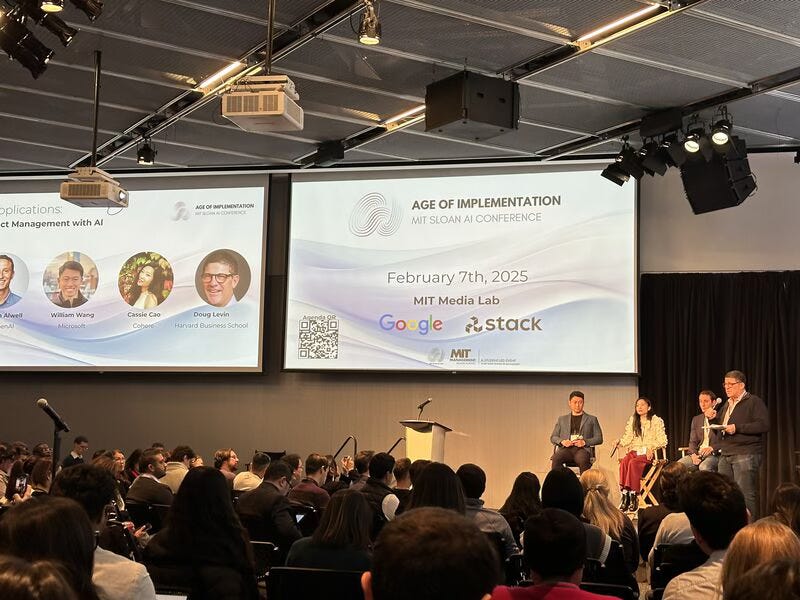Today I moderated the “Product Management with AI” panel at the MIT Sloan AI Conference located at the Media Lab, featuring Cassie Cao (Staff Product Manager, Cohere), Kevin Alwell (Technical Success, GTM, OpenAI), and Will Wang (Senior Product Manager, Microsoft).
The following Q&A is reconstructed from my best recollection, as I was fully engaged in moderating the panel and did not take notes.
The panel's first question was: “What is the biggest challenge in your role as a PM at Microsoft, Cohere, and OpenAI?” The panelists broadly agreed that the biggest challenge is balancing innovation with real-world (read: customer) implementations.
At Microsoft, the primary challenge is ensuring AI solutions integrate seamlessly with enterprise systems while maintaining security, compliance, and scalability.
At Cohere, the focus is on optimizing large language models to meet customer needs while managing costs and latency.
At OpenAI, the key difficulty lies in refining AI capabilities to make them more useful and controllable while addressing ethical concerns and mitigating risks of misuse.
Across all three companies, common hurdles include keeping pace with rapid AI advancements, meeting user expectations, and navigating complex regulatory landscapes to deliver impactful AI products.
The next question posed to the panel was: “What reactions have you seen inside your company to the market presence of DeepSeek?” The panelists agreed that there was no sense of existential threat in response to DeepSeek’s entry into the market. Instead, their respective companies viewed it as a natural evolution in the competitive landscape of AI.
At Microsoft, the focus remains on leveraging its deep enterprise relationships, infrastructure, and partnerships to maintain a leading position.
At Cohere, the emergence of DeepSeek was seen as further validation of the demand for advanced language models, with the company staying focused on its differentiation through enterprise-friendly AI solutions.
At OpenAI, while competition is acknowledged, the internal sentiment remained unchanged, as the company continues pushing the generative AI, agency and boundaries of AGI development.
Overall, the panelists conveyed that their companies took DeepSeek’s presence in stride, recognizing competition as an expected dynamic in the fast-evolving AI space, rather than a disruption to their core strategies.
The following question was: "As leaders in AI innovation, how do you balance the drive for rapid technological advancement with the need for responsible AI development and deployment?" The consensus answer: Balancing rapid AI innovation with responsible development requires built-in safety measures, human oversight, transparency, and regulatory collaboration. Companies refine AI models through robust testing, phased deployment, and ethical safeguards, ensuring outputs remain reliable and aligned with societal needs. Engaging with policymakers and industry peers helps shape responsible governance, while fostering an internal culture prioritizing ethics alongside innovation. Ultimately, the goal is to advance AI safely, ensuring it enhances human capabilities without introducing unintended risks.
The next question was: "What lessons have you learned about scaling AI solutions in enterprise environments, and how do those experiences inform your approach today?" The consensus answer was: Scaling AI in enterprises requires seamless integration, customizability, and strict compliance with regulatory standards. Success depends on efficient model fine-tuning, robust security, and scalable deployment while ensuring user adoption through effective change management. Cost efficiency and continuous iteration remain crucial, emphasizing practical implementation and close collaboration with enterprise stakeholders to drive long-term success.
As a final question, I asked each of the panelists to provide a forward-looking statement on how your company’s products will evolve with the advancement of Generative AI. The answers centered around expecting ongoing improvements in accuracy, functionality, and usability, alongside the expanded adoption of AI agents and a gradual shift toward more advanced general AI (GAI).
Once again, I have reconstructed this Q&A from memory and accept full responsibility for any inaccuracies or imperfections in these messages or responses.
Conclusion
This panel brought together industry practitioners to discuss advancements in AI technology, enterprise adoption, competition with DeepSeek, and the ongoing evolution of AI models. While AI safety, transparency, and regulatory alignment remain complex challenges, the industry has made significant strides since 2022. Key insights emphasized the importance of seamless integration, scalability, and ethical safeguards to maximize AI’s real-world impact. As AI continues transforming industries, product managers play a crucial role in bridging technical innovation with business needs, ensuring AI solutions are scalable, secure, and responsible. It was an honor to moderate this discussion and gain insights into how these companies are driving AI’s “Age of Implementation”.




